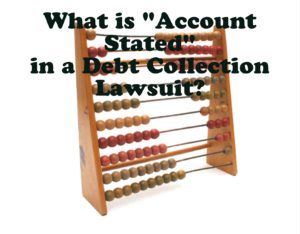By: Robert J. Nahoum
THE PROBLEM
Anyone who has been sued for an old debt will tell you that the process can be terribly confusing. The court papers used by the debt collectors are filled with legal jargon that makes little if any sense to non-lawyers. Debt collectors are always – 100% percent of the time – represented by attorneys in debt collection lawsuits that use their training and experience to their advantage.
One of the more befuddling parts of the court papers used by debt collectors is the complaint. The complaint is one of the documents that initiate a lawsuit. In particular, the complaint is the document where the debt collector makes its allegations against the consumer.
The complaint is broken down into “causes of action†which are the legal theories under which the debt collector argues the consumer owes the debt. One of the more common and self explanatory causes of action is “breach of contractâ€. As you might expect, breach of contract simply means that there was a contract between the consumer and the company extending credit and the consumer breached that contract by failing to pay the bill. However, in cases brought by debt buyers who buy the debt from the original creditors, breach of contract is rarely a slam dunk for the debt collector because it routinely lacks the evidence to prove the contract was created or what the terms of the contract were.
So, to hedge its bets, in addition to alleging breach of contract, debt buyers include a cause of action for “account stated.â€Â So what is account stated and what must the debt collector prove?
THE RULES
“Account stated†is a theory of liability that dates back in common law, hundreds of years to the medieval period.  Today it is used in debt collection cases to prove a consumer’s liability for a debt when the contract giving rise to the debt cannot be proven. The theory behind an account stated claim is that if a debtor receives an account statement of what he or she owes the creditor, and he or she does not object to the account statement, the law assumes that he or she has agreed that the correctness of that statement and so has promised to pay the debt.
Courts vary on what evidence is required to prove an account stated claim. However, in New York, it is generally accepted that an account stated can be supported by showing (1) an account statement was presented to the consumer; (2) it was accepted by the consumer as correct (which can be inferred from his or her failure to raise a timely objection to the amount stated as due); and (3) the debtor promised to pay the amount stated.
An account stated claim can be defeated by proof of a timely objection to the account statement, whether ultimately meritorious or not. Â A consumer challenging an account stated claim must raise specific allegations of protest, indicating when, how and/or to whom objections were made.
WHAT YOU SHOULD DO:
If you’ve been sued on an old debt and the complaint includes an account stated claim, recall whether any objection to the statement was made to the creditor. If so, by filing an answer with the court that includes a denial of the account stated allegations. Also, keep in mind that you are always bettered protected when you are represented by a skilled and experienced attorney. Consider speaking with a debt defense attorney to better understand your options and the cost of defense.
If you need help settling or defending a debt collection law suit, stopping harassing debt collectors or suing a debt collector, contact us today to see what we can do for you. With office located in the Bronx, Brooklyn and Rockland County, the Law Offices of Robert J. Nahoum defends consumers in debt collection cases throughout the Tristate area including New Jersey.
The Law Offices of Robert J. Nahoum, P.C
(845) 232-0202
www.nahoumlaw.com
info@nahoumlaw.com

